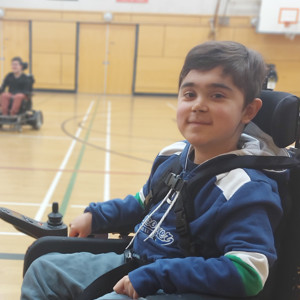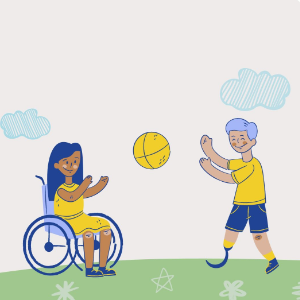During a time when being understood, included and involved is critical, classroom environments can be a daunting place for anyone affected by a neuromuscular disorder (NMD). Did you know Muscular Dystrophy Canada (MDC) offers tools to help educate a wide range of audiences on specific NMDs? These activities are tailored to open the conversation around disability and inclusivity.
- ‘Why are children with NMDs often tired?’‘Why use a scooter in theschoolyard, but not inside?’ Muscle Facts presentations provide schools with a better overall understanding of neuromuscular disorders. MDC staff join students and teachers to share information about NMDs and specific conditions experienced by students in the community, symptoms, equipment and why it’s used, and so much more! This presentation is a great opportunity for open discussion to improve the classroom experience for all.
- Not all educational staff have experience teaching students affected by NMDs. It can be overwhelming and you might not know where to start or how best to support that student. Don’t worry! MDC staff are here for educators too. Lunch and Learn sessions offer a great opportunity to learn about an NMD affecting a student and brainstorm ideas to promote an inclusive school environment. These sessions also help staff adapt their teaching, activities, or school to ensure the child’s needs are met.
- Every child has their own way of doing things. AccessAbility workshops promote awareness and understanding of people with disabilities by focusing on their abilities, using games and adapted communication techniques. Sponsored by the Canada Post Community Foundation, these workshops address not only NMDs but any type of disability, and focus on six main areas of development: function, family, fitness, fun, friends and future.

“It truly takes someone who understands not only NMDs but also a young student’s mind to be able to speak with them in a relatable and understandable way. My main concern going into this presentation, at my son Neema’s school, was how he would react and feel. But it was unfounded because the presentation focused on neuromuscular disorders, and how it affects every day life,” shared Natalija Manigoda. “I like how the students were completely engaged because the presentation was fun and interactive. I was pleasantly surprised by how many students had great questions. It was an incredible teaching moment that clearly explained how these disorders affect student life.”
Connect with MDC to set up a presentation that works for you! Email us at info@muscle.ca or call toll free at 1-800-567-2873. Find an MDC Service Specialist near you.




